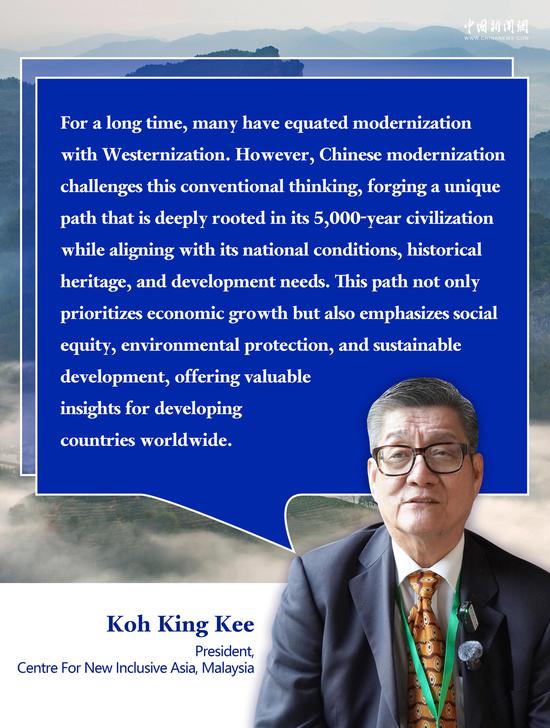Insights | Malaysian scholar: Chinese modernization offers new ideas, opportunities, and possibilities for the world
(ECNS) -- "Chinese modernization has not only driven China's economic and social transformation but also provided the world with an alternative development model distinct from traditional Western paradigms, offering fresh ideas, new opportunities, and possibilities for global development," Kho King Kee, president of the Center for New Inclusive Asia in Malaysia, shared his opinion on the global impact of China's path to modernization recently.
He noted that modernization has long been equated with Westernization. However, China has challenged this conventional thinking and pioneered a unique modernization path deeply rooted in its 5,000-year-old civilization, tailored to its national conditions, historical culture, and developmental needs," he said. This path not only prioritizes economic progress but also integrates social equity, ecological sustainability, and long-term stability—offering valuable lessons for developing countries worldwide, he noted.
Kho emphasized that China's rich cultural heritage has played a crucial role in shaping its modernization journey. The wisdom accumulated over thousands of years, particularly Confucian, Daoist, and Legalist philosophies, has provided essential guidance for China's governance model.
Confucianism advocates "putting people first" and "harmony among nations," Daoism emphasizes "the unity of humans and nature" and "following the natural order," while Legalism upholds "the rule of law." According to Kho, these philosophies have not only influenced China's national character but have also become key pillars of its modernization, enabling a seamless integration of traditional values with contemporary governance.
Using Confucianism as an example, Kho highlighted that Chinese modernization, at its core, is the modernization for the people. "It places human well-being at the center, emphasizing comprehensive personal development, social justice, and shared prosperity." As early as 2,000 years ago, Confucianism proposed that "the people are the foundation of the state" and "good governance depends on winning the people's support, Kho noted, adding that this principle remains central to China's development strategy today, ensuring that economic progress goes hand in hand with social equity and that the benefits of modernization are widely shared.
"At a time when the world faces mounting challenges—regional conflicts, environmental crises, and rising uncertainty over multilateral cooperation—Chinese modernization offers not just a transformative model for China but an alternative vision of development for the global community," Kho stated. "By demonstrating that modernization does not have to follow a Western template, China provides fresh perspectives, new opportunities, and renewed hope for a more inclusive and sustainable future," he concluded.(By Wang Gaofei, Zhao Li)


